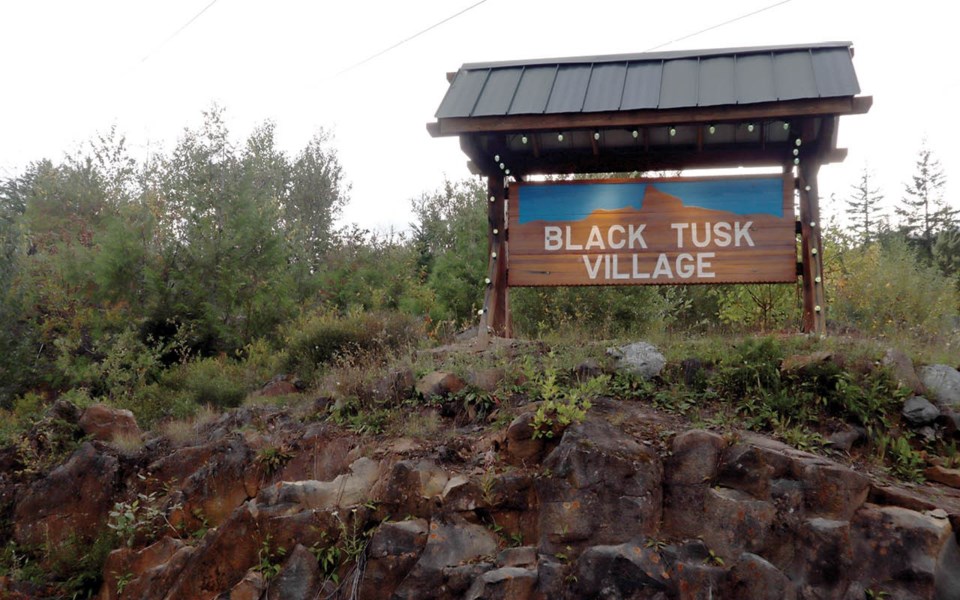It's not every day that a governing body declines $4.5 million in federal and provincial money for an infrastructure project.
But the Squamish-Lillooet Regional District (SLRD) did just that at its Jan. 29 board meeting, following a near-unanimous vote from Black Tusk Village strata members to decline the funding and upgrade its wastewater facility.
A gated community located south of Whistler, Black Tusk Village's wastewater treatment plant is more than 35 years old and in need of upgrading, according to the SLRD. It is now in compliance with its Ministry of Environment permit, but was not at the time the grant application was made.
In October, strata members voted 69 in favor and four opposed to "reject" the $4,508,328 grant (made up of both provincial and federal government funds), which would have been used to upgrade the community's wastewater collection system and redirect wastewater to a new, expanded treatment facility in the adjacent community of Pinecrest Estates. Responsibility for the treatment centre would have also be transferred from Black Tusk Village to the SLRD. The total project was estimated to cost more than $6.1 million.
Seventy-three of 94 Black Tusk Village strata lots were represented in the vote.
As part of a proposal put forward by the SLRD and Black Tusk Village, strata members would have been responsible for 26.67 per cent of the total project cost ($1,639,672).
They would have also been responsible for any cost overruns.
Black Tusk Village's eventual decision to forgo the plan appears to have caught the SLRD by surprise.
Tony Rainbow, board chair of the SLRD, said he learned of the strata council's decision after the money was awarded in August.
"The strata council made [its] decision amongst themselves and didn't bother to tell us," said Rainbow.
"In May or June of last year, they decided, 'Oh, we're going to go a different way. We're not going to have a new facility, we're going to retrofit our old one.'
"If they had have told us at that time, we could have pulled the application, which would have meant that another community would have received the grant instead of us."
According to Danny Epp, president of the strata council, it only agreed to support the grant application on the condition that the SLRD would be open to making "major changes" to the plans for the new treatment plant if the grant came through.
He added that he thought the community would be unlikely to win the grant given its small size and the large requested amount.
Epp said that SLRD was not amenable to changing the plans after the money was secured.
He added that the $1.65-million Black Tusk Village portion of the project was untenable for taxpayers and that they would also risk having to pay more if the project went over budget.
"[The project] was [also] going to be very disruptive to the community," said Epp.
"[The SLRD] wanted to tear up all of our streets and put all new services in place.
"In addition to that, we had no confidence that the SLRD could actually carry out this project, as they didn't have any staff to be able to manage it." Epp said that the community is planning to bring its treatment facility up to "new condition" on its own, funding the project itself.
Once that work is completed, he said that the strata council would like to gain a sense of operating costs, and then transfer the facility to the SLRD.
"Once we've completed that upgrade, we want the SLRD to assume that responsibility," he said, adding that the community intends to spend up to $500,000 for previous and future improvements.
"We are now spending the money to upgrade that plant, so that it is like new...It will be good for another 30 years."
The SLRD, however, has reservations about taking on the facility and Rainbow feared that the process could be costly.
"We are under no obligation to take over a wastewater treatment plant, and if we were going to take over a retrofitted 35 year-old-plant, there would be some pretty significant conditions attached to them," said Rainbow.
A fund would have to be established to pay for a new project for the community down the road, he added.
"[The strata council] seems to think that if the SLRD owns [the wastewater treatment facility], there's some money available to support it from somewhere other than their community. But that's not how regional districts work," said Rainbow.
"If we're operating a service in a community, then that community has to pay 100 per cent of the cost of that service."
Rainbow is concerned that the situation could end up costing strata owners more in the long run.
"Their main reason for turning down this grant was to save money—and it's so shortsighted," he said.




